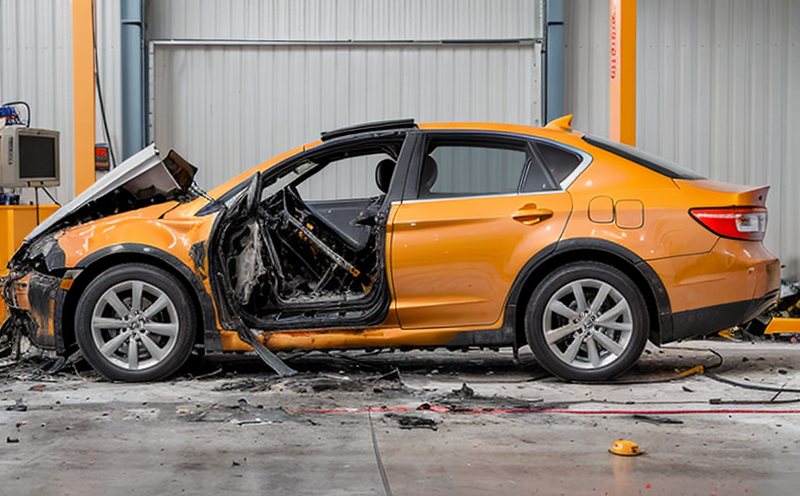EN 61427 Mechanical Shock and Abuse Testing of Batteries for Renewable Energy Systems
The European standard EN 61427, titled "Safety of electrical equipment in the open air used outdoors," specifically addresses safety concerns related to outdoor electrical equipment. Within this framework, Part 3 focuses on batteries intended for renewable energy systems (RES). This section lays out stringent requirements designed to ensure that these batteries can withstand mechanical shocks and abuse without compromising their integrity or endangering human life.
One of the critical aspects of EN 61427 is its emphasis on safeguarding against mechanical stresses that might be encountered during installation, transportation, handling, or operation. These could include impacts from tools, accidental drops, or even harsh environmental conditions such as freezing temperatures followed by thawing cycles. By conducting rigorous tests according to this standard, manufacturers and designers can guarantee the reliability and safety of their products.
The mechanical abuse testing outlined in EN 61427 aims at simulating realistic scenarios where a battery might experience significant physical stress. For instance, it may involve applying controlled impacts using specified weights dropped from certain heights onto different parts of the battery casing or terminals. Another test involves subjecting the battery to repeated temperature cycling combined with static load tests to assess its resistance under extreme conditions.
Moreover, this standard covers various types of batteries used in renewable energy applications, including lithium-ion (LiFePO4), lead-acid, and nickel-metal hydride. Each type has unique characteristics that make them suitable for specific applications within the RES context. Ensuring all these batteries comply with EN 61427 helps maintain consistent quality standards across diverse markets.
It is important to note that compliance with EN 61427 does not only benefit manufacturers but also end users who rely on dependable renewable energy solutions. When selecting a laboratory capable of performing these tests, it's crucial to ensure they have expertise in handling high-risk materials safely while maintaining accuracy and precision throughout the entire testing process.
In summary, EN 61427 provides essential guidelines for ensuring that batteries used in renewable energy systems meet stringent safety requirements regarding mechanical shocks and abuses. By adhering strictly to these standards during product development stages, companies can enhance their reputation for producing safe and reliable products while complying with international regulations.
Industry Applications
Battery technology plays a pivotal role in the renewable energy sector, where batteries are essential components of storage systems that enable efficient utilization of solar power and wind energy. These systems require robust batteries capable of enduring harsh environmental conditions while maintaining performance over extended periods.
EN 61427 mechanical shock and abuse testing ensures that these batteries can withstand various stressors encountered during their lifecycle—from manufacturing to installation, transportation, operation, and eventual disposal. For instance:
- Manufacturing: Ensures the integrity of the battery cells before they are assembled into modules or systems.
- Transportation: Protects against potential damage during shipping.
- Installation: Helps verify that batteries can handle rough handling during setup without compromising functionality.
The results of this testing provide valuable insights into how well a battery will perform under real-world conditions, thereby increasing confidence among stakeholders involved in renewable energy projects. Compliance with such standards fosters trust between manufacturers and customers, promoting safer deployment practices across the industry.
Eurolab Advantages
Accurate Testing: Eurolab boasts state-of-the-art facilities equipped with precision instruments capable of replicating actual field conditions. Our dedicated team ensures that each test adheres meticulously to the specified parameters outlined in EN 61427, guaranteeing reliable and reproducible results.
Comprehensive Knowledge: With years of experience in battery testing across multiple sectors, Eurolab's professionals are well-versed in interpreting complex data sets generated during these evaluations. They offer expert advice on improving product designs based on test outcomes, helping clients stay ahead of regulatory changes and market trends.
Efficient Turnaround: Our streamlined processes allow us to deliver timely reports that meet tight deadlines without compromising quality. This enables our clients to incorporate feedback into their ongoing R&D efforts or respond swiftly to new opportunities in the marketplace.
Compliance Support: Eurolab stays updated with all relevant standards and guidelines, ensuring compliance throughout every stage of testing. Our goal is not only to meet current requirements but also anticipate future expectations, providing comprehensive support for navigating evolving regulatory landscapes.
Why Choose This Test
Selecting EN 61427 mechanical shock and abuse testing offers numerous benefits that contribute significantly to the overall success of a renewable energy project. Here are some compelling reasons why choosing this test is advantageous:
- Enhanced Safety: By ensuring batteries can withstand real-world stresses, you enhance public safety by reducing risks associated with potential failures.
- Better Quality Control: Rigorous testing identifies issues early in the development process, allowing for necessary adjustments to improve product quality before mass production begins.
- Increased Reliability: Demonstrating compliance builds trust among consumers and partners, fostering long-term relationships built on reliability.
- Regulatory Compliance: Ensuring adherence to international standards helps avoid costly penalties and potential delays in market entry.
- Competitive Edge: Meeting stringent safety criteria sets your product apart from competitors, enhancing brand reputation and attracting customers seeking trustworthy solutions.
In conclusion, investing in EN 61427 mechanical shock and abuse testing demonstrates a commitment to excellence that extends beyond mere compliance. It reflects an understanding of the importance of reliability and safety, ensuring that your renewable energy projects contribute positively to both the environment and society at large.





